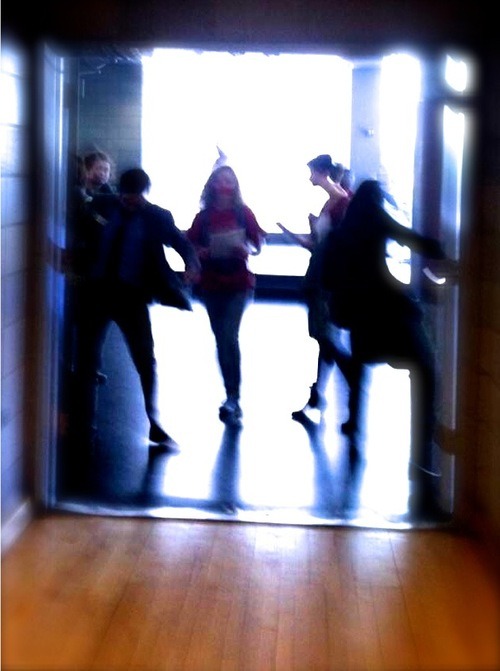Breaking Past the Brochure
Columbia Admissions Officers Blockade Students from Talking to Prospies about Sexual Assault
By George Joseph
(Note: Names have been changed to protect students from further administrative reprisal.)
Members of No Red Tape, a Columbia University students’ group, attempted a silent action today at a gathering for prospective students. Following the example of Dartmouth students last year, No Red Tape members felt it important to reach out to “prospies” and their families to make sure they knew what they were getting themselves into by choosing to attend Columbia. Nonetheless, to ensure that students and parents would actually hear about the issue, the activists planned a relatively modest action.
“Going into this action, we had a very simple plan: wear red tape on our mouths, distribute our flyer, and engage prospective students with this issue as on college campuses everywhere,” said Rebecca Hannover, a Barnard College first year. “As indicated by the flyer, all we did was urge students to take action and reveal the silencing that takes place at Columbia and other universities. Parents were eager to take flyers, sometimes going out of their way to grab one.” Ironically, in what is surely being discussed as a bad decision in a bleak communications office somewhere, Columbia administrators chose to silence a silent protest about the silencing of campus survivors.
Before the nine students could even walk in, admissions officers and guards immediately, as if expecting the action, pushed students back, closing off all the doors to the auditorium.
“Elevator opens, we put on our red tape and literally as we turn the corner, three or four guards and administrators immediately declare ‘This is a private event’ while two other guys promptly run to shut all the entrances,” said Carmen Velasquez, a Columbia senior. “It was also interesting how much they were speaking for the prospective students, they said, ‘You can’t hand these out.’ as if it was gonna freak them out.” Velasquez added, “They were completely dictating what students are allowed to say to prospective students.”
Hannover also highlighted this censorship, which has become an issue at Barnard and Columbia recently with the administration’s recent decision to take down an SJP banner.
“I think the thing that really struck me the most was that later when we finally snuck in there, the admissions officers attempted to control our physical motion by claiming that we couldn’t walk around the area.This surveillance of motion and control of bodies is significant because having a flyer, despite its serious content, won’t have the same impact as physical presence at the fair.”
The strange scene of administrators blocking the students’ entrance is the physical manifestation of a censorship apparatus pervasive at Columbia. The students, almost all women, were pushed back by guards, physically blocking the flow of information and, in the process, determining for Columbia’s incoming students what is and what is not legitimate knowledge.
“If you’re a survivor and you’re trying to pass on this information, and you’re literally pushed out of a space,” said Velasquez, “it's one of the most silencing things.”
Students were forced to hand out flyers the auditorium and outside the building, walling off uncomfortable perspectives and voices.
Velasquez noted, “The whole registration process is just a way to filter us out in the first place. Just because students are not part of a ‘legitimate’ campus group, which requires a formal bureaucratic process, they act as if our voices cannot represent our own community.”
“What I hope people see from this is not just what we did, but also how quickly and aggressively the administration reacted to this,” Velasquez. While the event may not seem like a huge deal, the force used to put down the students reflects the larger social pressure exerted on students every day to cover up and normalize sexual violence.
“We heard another student tell someone that this was inappropriate because it gives a false image of what Columbia is. But we’re here to say that our experience is part of Columbia too, and it's time to change that.”
George Joseph
George Joseph is a labor and education reporter, who looks to The Wire and Toblerones for daily inspiration.
Catch up with me @GeorgeJoseph94.


